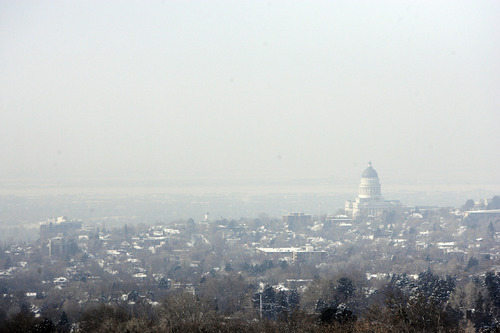This is an archived article that was published on sltrib.com in 2014, and information in the article may be outdated. It is provided only for personal research purposes and may not be reprinted.
A federal judge on Tuesday tossed a lawsuit filed by an environmental group alleging the U.S. Environmental Protection Agency has been too soft on Utah's failure to implement air pollution plans on time.
Since WildEarth Guardians filed the suit in May, the state Division of Air Quality has submitted so-called state implementation plans for Utah County and Salt Lake City-area airsheds, but after deadlines imposed by the Clean Air Act.
The EPA officially declared northern Utah valleys, which are often choked by winter inversions that trap pollution near the ground, out of compliance with federal air-quality standards more than four years ago.
That required the state to lay out a road map for reducing concentrations of hazardous fine particulate, air pollution known as PM2.5, to acceptable levels by 2019.
Part of the suit was rendered moot when Utah finalized its plans in January, but WildEarth still pushed for a declaration that the state failed to submit them in a timely manner.
The group argued that the EPA should consider imposing its own pollution-reduction plans on the state, since Utah regulators can't be trusted to implement programs to protect human health fast enough.
There was no dispute that Utah blew a June 14, 2011, deadline, but there was no agreement on what the consequences would be. The issue before U.S. District Judge William Martinez was whether the EPA invited a citizen suit for failing to punish the state.
While sympathetic to WildEarth's position, the Denver-based judge found the agency is protected by sovereign immunity in this situation. Federal law gives states "wide discretion" in crafting pollution plans. The EPA's role is relegated to a "ministerial function" to review them for consistency with the Clean Air Act, Martinez wrote in his order, dismissing the suit on the grounds that the court lacks jurisdiction.
Meanwhile, Utah air-quality officials may soon be returning to the planning room. The EPA may upgrade the Salt Lake City-area's PM2.5 problem from "moderate" to "serious," a move that is anticipated to occur this year.
This new designation could result in tougher standards on industrial polluters, requiring them to explore "best available control technologies." The current plan expects polluters to pursue control measures that are at the very least "reasonably available."



